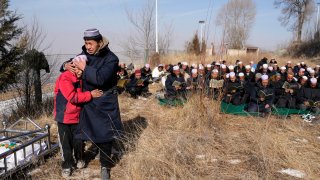
The death toll from China’s most powerful earthquake in years has risen to 149, with two people still missing after the tremor hit northwestern parts of the country last week.
The 6.2-magnitude quake struck a remote mountainous area between Gansu and Qinghai provinces on Dec. 18, reducing homes to rubble and triggering heavy mudslides that inundated two villages in Qinghai province.
State broadcaster CCTV said Monday the death toll in Donghai city in Qinghai has risen by one, to 32, and rescuers were still searching for two missing people. In neighboring Gansu, authorities had reported 117 dead.
Nearly 1,000 were injured and more than 14,000 homes were destroyed in China’s deadliest earthquake in nine years.
Get top local stories in San Diego delivered to you every morning. >Sign up for NBC San Diego's News Headlines newsletter.
Primary schools in Jishishan county in Gansu resumed classes in tents on Monday, state media reported. Local authorities said they would use the upcoming winter break to repair damaged schools and erect temporary structures so that classes could resume as normal in the spring semester.
Authorities also rushed to erect temporary housing units for survivors facing temperatures well below freezing. CGTN, the state broadcaster’s international arm, said the first batch of 500 temporary housing units had been built for residents in Meipo, a village in Gansu, on Friday night.
More than 87,000 people have been resettled after the quake.
U.S. & World
The tremor caused economic losses estimated to be worth tens of millions of dollars in the agricultural and fisheries industries, according to state media.
Chinese Premier Li Qiang on Saturday visited several villages in Gansu and a county in Qinghai and urged authorities to improve living conditions for the survivors, the official Xinhua News Agency reported.
Li said the top priority of relief efforts was to make sure people stay warm and safe in winter.
Funerals were held throughout the week, some following the Muslim traditions of much of the population in the affected area.
Most of China’s earthquakes strike in the western part of the country, including Gansu, Qinghai, Sichuan and Yunnan provinces, as well as the Xinjiang region and Tibet.
The country’s deadliest earthquake in recent years was a 7.9-magnitude tremor in 2008 that left nearly 90,000 dead or presumed dead and devastated towns and schools in Sichuan province, leading to a yearslong effort to rebuild with more resistant materials.



